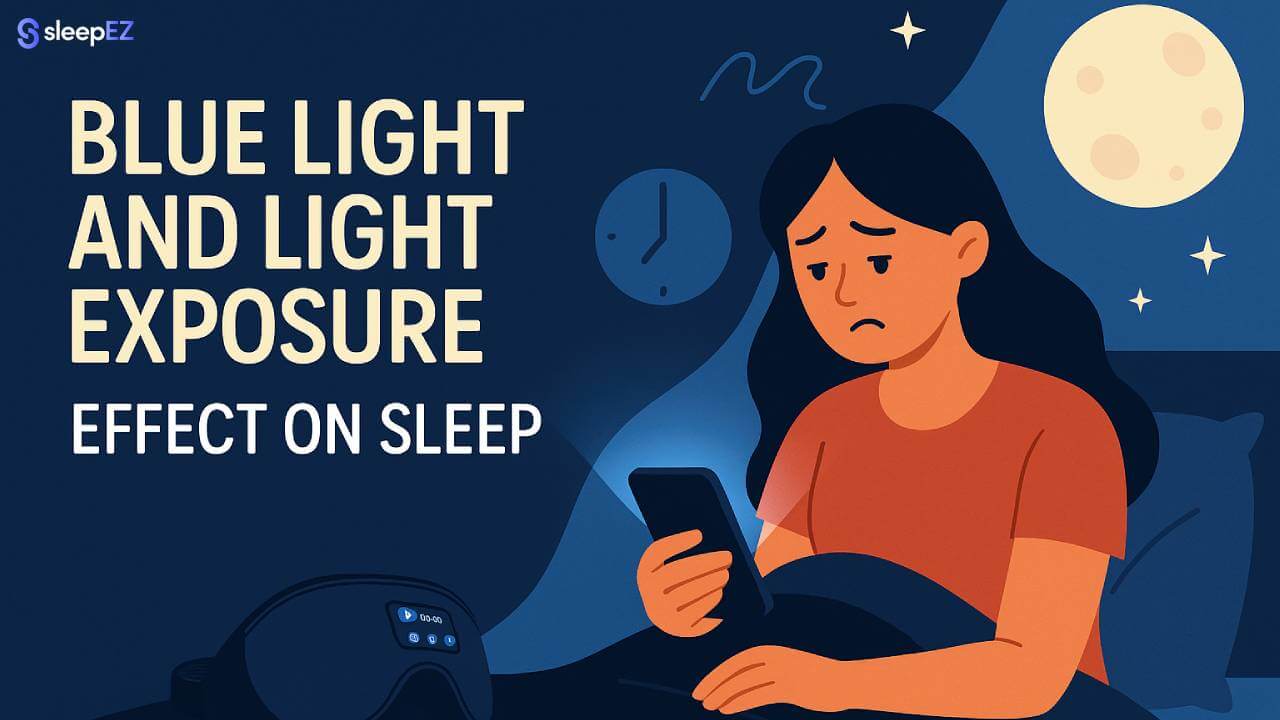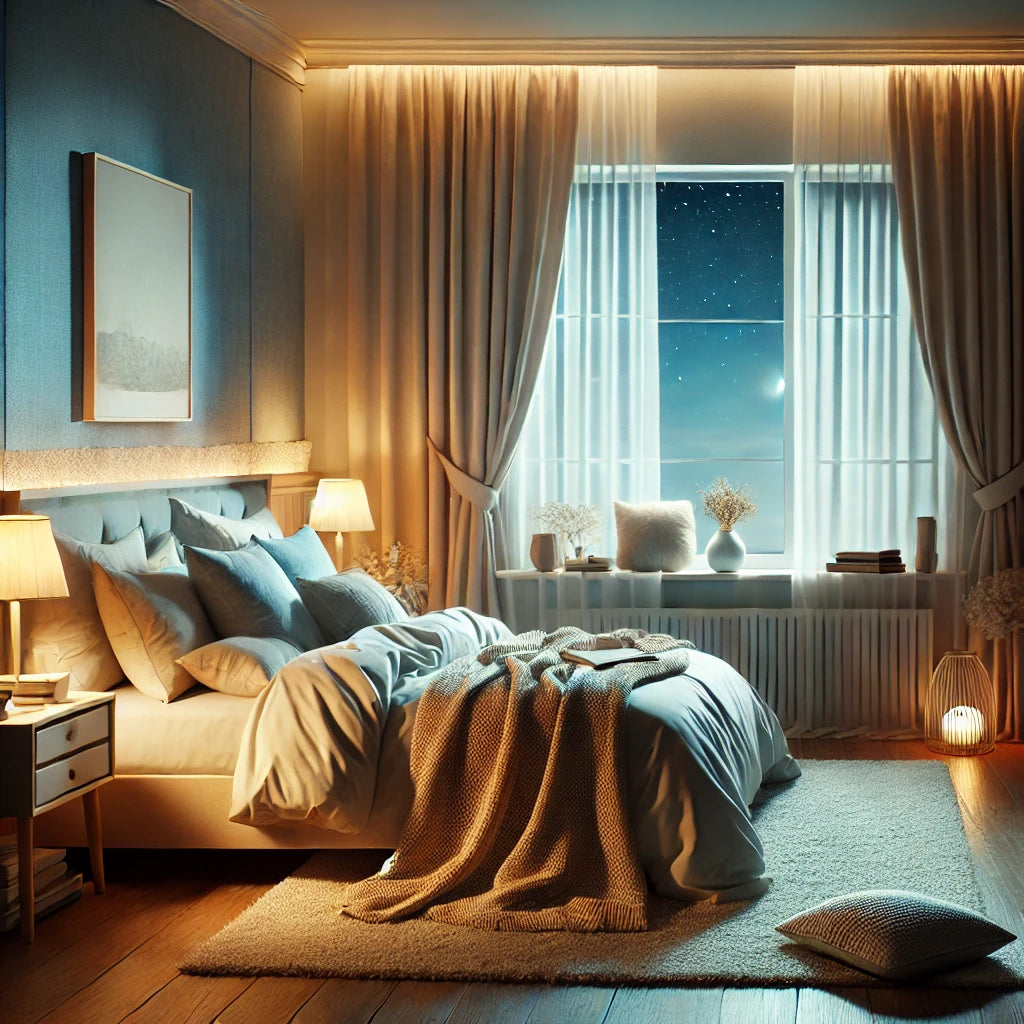You're knackered. It's been an exhausting day, you're ready for bed, you hop into bed but... nothing. You just can't get to sleep.
You're then wondering? Why? WHY can't I sleep? Even though I'm so exhausted?
Well, the answer is right above your head. Hint, Hint, Here's a 'light bulb moment' – Lights and lighting exposure.
It's one of the biggest reasons our bodies know when it's bedtime and when it's time to wake – it's the foundation to sunrise and sunset. Most of us wake up in the morning and fall asleep at night. Although these days, with so many different lights and glows beaming at us, we need to be especially careful with light and the way it affects our sleep.
We stare at our phones doom, scrolling social media or watching content on YouTube, it could be the brightness in the lights within your home, it could be the glow from your smart TV or the blue light emanating from your digital alarm clock.
Let's break down why light is so impactful to our sleep and what you need to start doing in order to knock out like a light switch (pun intended).
What Is Light Exposure, Really?
Light exposure literally means anytime you are exposed to lights – Sounds simple, right? But it's sneakier than it sounds.
- Here's where it comes from:
- The sun (obviously)
- Overhead lights at home
- Your phone screen at 11pm (don't lie to us we know you do it)
- Street lights shining through your curtains
- Even that blinking red dot on your TV
Light is a main ingredient that sets your body's natural daily clock. Your brain uses it to tell the time and knows when it's time to rise or when it's time to knock out.
Unlike the sun which shines during the day, artificial lights (which, mind you, are very useful for everyday life) can shine non-stop and trick your brain into thinking it's still daytime when in fact it isn't. This has a direct impact on your melatonin production and, in turn, your sleep suffers.
How & Why Light Disrupts Your Sleep
Let's dive into some scientific terminology you might recognise – 'circadian rhythm'. This is essentially your body's internal timekeeper that regulates when you should feel sleepy and when you should be alert.
This biological clock orchestrates the production of melatonin, your body's natural sleep hormone that signals it's time to drift off. When light enters your eyes at the wrong time, it's like someone sending your circadian rhythm a text saying, "Hold that melatonin production, we're still partying!" Your brain gets confused, melatonin gets suppressed, and there you are, wide awake when you should be sleeping.
Melatonin: Your Best Ally when it comes to Sleep (and when it's not kidnapped by light)
Here's the deal: your brain makes this amazing hormone called melatonin that essentially whispers, 'hey buddy, it's time to sleep, to rest your body' - but here's the catch, your brain only makes this sleep potion when it's dark.
The Centre for Disease Control - yes, those serious folks - point out that when light hits your eyes at night, it blocks this crucial sleep signal faster than your ex blocks you from a bad breakup - and now low melatonin isn't just about feeling tired, it also leads to those wild mood swings, cranky days and even some long-term health issues you definitely don't want to get down the track.
Now, the circadian rhythm is your body's 24-hour schedule; think of it like your calendar but for 24 hours. It literally runs everything from sleep to hunger to mood, but light exposure at the wrong time, i.e. you on your phone too long scrolling your hilarious reels, might be throwing you out of whack. Scientists call this the circadian misalignment, while we call it grumpy bum mood at 9am.
When your circadian rhythm is running smoothly, it controls:
- When your stomach starts growling for food
- Your body temperature (why you get toasty before bed)
- Hormone release (hello, melatonin!)
- Digestion (that midnight stomach rumble? Timing's off)
- Even your mood (why you're grumpy when sleep-deprived)
Scientists literally call light the "strongest time cue" for your body clock. Without proper light and dark cycles, your sleep timing gets thrown into a blender, and nobody wants that horrible smoothie. Trust us.
When your circadian rhythm is working as intended, you naturally get sleepy around the same time each night and wake up feeling refreshed without an alarm (yes, that's actually possible).
But when light exposure happens at wonky times, you get what sleep scientists call "circadian misalignment" – which is fancy talk for "your body has no idea what time it is and now you're tired all day and wide awake at night."
Now Let's Talk about the Bad Guys when it comes to Light
Not all lights are created equal; some are better than others, and when it comes to destroying your sleep, let's meet the culprits.
Blue Light
Your phones, tablets, laptops and TVs are jam-packed with the biggest disruptive light known as blue light. It's like they all came together to gang up on you and to keep you awake (spoiler alert: the more you scroll, the more ads you see).
Those Harvard geniuses discovered blue light can push your bedtime back by up to 3 hours. THREE HOURS! That's like flying from Sydney to Auckland without the vacation part.
And it's not just about falling asleep - blue light before bed leads to lighter sleep, less dream time, so even if you sleep for 8 hours, you might wake up feeling like you haven't had a proper sleep. That's what we want, is it?
Indoor Lighting
You think your normal everyday indoor lights would be fine, right? Yeah nah, wrong - these LED effect lights are silent sleep assassins as well. Most of the time at 10pm, they're saying, 'Rise and shine, baby, let's wake up!' Even the innocent red lights on TV and soft glow from your alarm clock are sleep disruptors. Scientists, who have apparently nothing better to do, found that sleeping with even the modest light exposure raises heart rate during sleep. Your body is literally working the night shift instead of restoring itself.
Ambient Lights
The street light peeking through your curtains, your neighbour's motion sensor porch light every time a cat decides to go about a stroll and sets off the light - all seem to be innocent light sources that add to this tragic sleep mess.
Natural Light Gone Crazy
Now, listen, don't get me wrong, we all love the sun, it's warm, it's beautiful, it's fun, but when it's supposed to be there, the morning sun is great for your body clock, but too much bright light in the evening can throw that sleep schedule off. Before electric lights were a thing, people went to sleep when it got dark, absolutely mind-blowing, right? Nowadays, we stay hours after sunset and we're fine with that.
How Your Body Reacts When Light Ruins Your Sleep
When light exposure messes with your sleep, it's not about that groggy feeling the next day, it's much worse:
- Your hunger hormones go proper haywire (No 1am snacks, please)
- Your stress hormones decide to party at the wrong times
- Your immunity tank drops and catching a flu becomes so much greater (yay! Time to chuck a sickie)
- Your skin looks... let's just say filters were invented for a reason
- Your workouts feel like a burden
- Your memory gets real foggy and sometimes you feel worse off than the 3-second memory of a goldfish
Now, a bunch of sleep scientists have come to the conclusion that when your body clock gets confused by light during the wrong times, you end up:
- Staring at the ceiling when you should be sleeping
- Waking up at 3am to contemplate all those bad life choices you made
- Feeling like a zombie throughout the day
- Being generally less healthy
The Lights Out Solution - How to Fix Your Sleep
Ready to stop this light-induced sleep robbery? Here's how to get those precious Zzzs back on track:
The Screen Curfew
Put your devices to bed 90 mins before you hit the sack. No exceptions. Not even the 'just one more reel' part. Your TikTok and IG feeds will still be there tomorrow.
Night Mode Magic
If you absolutely MUST look at screens (we get it, sometimes you just have to), use night mode on everything: your phone, your laptop, your tablet, your TV (if it has one). Or even better, maybe invest in those blockout blue glasses?
Bedroom Blackout Bootcamp
Make your bedroom darker than a cinema - blackout curtains are your key here. Cover up those little electronic lights too; even tiny red dots on your TV are plotting against your sleep.
The Sunset Switch
About two hours before your bed, start dimming your lights around the house; better yet, switch to warm amber lights. Your great-great-grandparents used candles after dark, and they slept like kings and queens back then.
Morning Light Party
Here's the actual plot twist: get BRIGHT LIGHT in the morning. 10-20 mins of outdoor morning sunlight tells your body 'hey, it's daytime, time to be awake', which, weirdly enough, helps you sleep better later.
The Sleep Mask Solution
Now unfortunately, we can't control all the light in your bedroom, and living in today's age, it can be difficult with all of life's gadgets and accessories: your Apple Watch, Fitbit, your iPhone or Galaxy. It could also be you share a room with someone who is a book fiend until 2am, or maybe you're a shift worker that needs to sleep during daylight hours - a sleep mask might be your best sleep saviour. Sleep masks block all light from reaching your eyes, helping your brain pump out melatonin even if your room resembles Times Square on New Year's Eve.
Sleep masks work particularly well for:
- People who share rooms with night owl partners
- Travellers trying to sleep in hotels or on planes (where there's always that ONE overhead light)
- Shift workers attempting the impossible task of sleeping while the sun is shining
- Side sleepers who need flexible light blocking that moves with them
Some sleep masks even go high-tech now, playing calming sounds or white noise while blocking light. Ahem ‘Dreamy Sounds Sleep Mask the Sleep Mask with Bluetooth Headphones’ Two-in-one sleep solution? Yes, please!
The Bottom Line
Light isn't the enemy—badly timed light is. Your body evolved over millions of years to sync with the sun's patterns, but we've spent the last century creating a 24/7 light show that's confusing the heck out of our brains.
The light signals that worked for our ancestors (sunrise = wake up, sunset = wind down) have been replaced by blue light blasting into our eyeballs at 11 PM while we watch "just one more episode" or scroll through endless social media feeds.
Take back control of your light environment, and you'll be snoozing better than an owl does during the nighttime. Your future well-rested self will thank you—probably by being more productive, less grumpy, and much better looking.
Remember: good sleep starts with darkness. Your brain literally requires it to make melatonin. Give your body the darkness it craves, and better sleep will follow.




Leave a comment
This site is protected by hCaptcha and the hCaptcha Privacy Policy and Terms of Service apply.